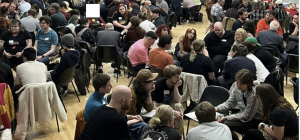Questions to think with
Annie Teriba •Annie Teriba asks 4 questions about Jeremy Corbyn’s campaign. This is an open invitation to help think through what it means.
1. How does the changing nature of struggles jar with the narrative coming from Labour elites?
Local campaigns are doing work not just to fight austerity but also to rebuild community. Local battles and/or victories are empowering people to reconceptualise politics breaking down the perception that Government has a monopoly on the power to improve or worsen material conditions. Is it possible that this is why the claims of electoral oblivion are falling on deaf ears? Firstly is the idea that a Labour election victory is the end rather than a means to a more just society being complicated as Labour’s ineffective opposition is making the two more distinct? Secondly, because people are looking for new solutions that deal with local problems, do they see less of a need for Labour as a vehicle to articulate a reformist vision of a fairer society?
2. How can we understand Jeremy’s policy strategy?
There’s an element of this which can reconcile the charges of being an old white lefty. He seems to be taking lessons on strategy from the ‘old left’ and applying them here with quite a bit of success. His policies appear to have been written by people who have been embedded in those campaigns, and so there seems to be an element of taking local struggles as lessons for the national stage. Is this a good route into talking about the ‘social movement’? What are the possibilities of making Labour a nucleus for local struggles?
3. What do we think of Corbyn’s chances in 2020?
If we think he has a shot, should we also be talking about what he needs to do between now and then? I’m really curious about how a leader who sees himself as a vessel for a broader movement might destabilise the politics of personality. I’m also interested in how far we think this idea of a social movement might help push unionisation and mobilise beyond what has been achieved already. How can we articulate an optimism about this without glossing over its limitations?
4. Where do we fit in?
This is the most important question. There are a few parts that I want to explore. First, how do we win people round to our politics as labour shifts left? Second, if the way people are relating to struggles and thus the Labour party is shifting, is the language of reformism sufficient for these relations? Are the limitations and risks of the pull of parliamentary politics changing too – because it doesn’t definitely look like they’re getting any less significant?











2 comments
There is no answering these questions from the outside. If Corbyn wins RS21 should join Labour.
Though very useful, these questions work mostly on the assumption that people are responding to Corbyn as a policy-maker and thinker. Whilst that is true to an extent (especially when it comes to issues like rent and renationalisation), I think ‘personality politics’ is playing a bigger part than we might admit. Corbyn appears to have principles – to be firm, honest, and a safe pair of hands, and I don’t think we should underestimate how much these personal traits play a part in people’s allegiances. A lot of people don’t think in left/right terms; or at least, they don’t like to. For many of these people, Corbyn is attractive because he has principles, a strong character and he refuses to back down.
Sadly, this is also the perception which gained Nigel Farage so much traction at the last election, and so I don’t think we can draw as many conclusions as we might like from the Labour electorate’s ‘shift left’. I don’t think it necessarily indicates widespread grassroots radicalism. The most we can say is that the popular support for Corbyn indicates a yearning for a different sort of politics to the game-playing of the current political class.
The left’s reliance on Corbyn’s personality will pose problems if his campaign or leadership hits any obstacles before 2020: when support congregates around a strong leader, it can just as easily fall apart when that leader is weakened. So, between now and then, we should be doing all we can to convince people of the efficacy and value of left-wing policies and arguments, particularly on economic issues, where ‘common sense’ has moved so far to the right. We will also have to fight in the media flame war that will follow if Corbyn gets elected. It’s a slow climb but I’m hopeful that Corbyn could win in 2020, given the right conditions and the mobilisation of enough supporters.